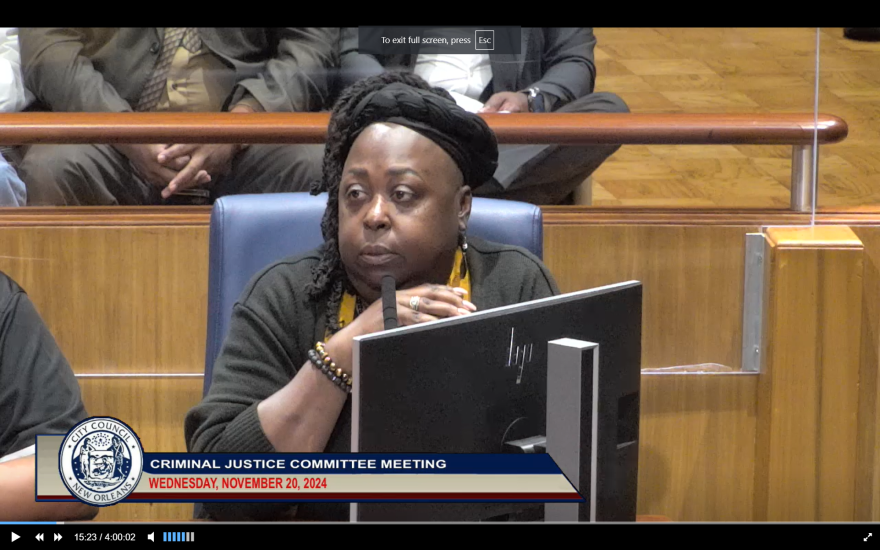New Orleans second lines could see more city regulations, including larger police details, after a pair of shootings that killed two people and injured at least 11 at a 9th Ward parade on Nov. 17.
During a special meeting this week, city councilmembers voiced support for adding more guardrails for the year-round cultural celebrations, elevating them on the same level as Carnival and Mardi Gras parading groups. More rules could help keep attendees safe while staving off unwanted violence, said District E Councilman Oliver Thomas.
“This is about how we have a respect of a culture,” Thomas said. “We’re not blaming the culture and the tradition.”
Thomas called the city’s criminal justice committee into a meeting to discuss the shootings and the city's relationship with New Orleans Social Aid and Pleasure Clubs, which put on the events. Members didn’t introduce or pass any new policies, but Thomas said he wanted to “get recommendations and at some point appoint an advisory committee to look at recommendations.”
“Then we can talk about maybe a charter or code of conduct,” he said.
Future proposals could see community pushback. Second line organizers have long resisted city overreach of their activities, which have been a sacred part of New Orleans’ Black community for generations. Dozens of parades take place throughout the year, and many draw thousands of attendees.

In 2007, local organizers successfully sued the city after the New Orleans Police Department charged excessive escort fees for second line parades. New Orleans’ long-running federal consent decree has also limited police infringement on cultural activities.
While smaller second lines happen without city oversight, organizers of large second lines are still required to obtain permits and pay for police escorts. Costs can run over $3,500 for a single parade permit.
The events are regularly safe, joyful and are the “heartbeat” of New Orleans’ culture, said Tamara Jackson, director of New Orleans Social Aid and Pleasure Club Task Force.
“Please do not look at it as a black eye on the culture,” she said. “But we want to be as cohesive as we possibly can to work with everyone at the city so that what we do is beneficial to us all.”
The shootings on Nov. 19 should be seen as part of a broad citywide problem of crime and poverty, Jackson said.
“Mardis Gras has an entire police department, state troopers, sheriff’s office staff and we still have incidents,” she said. “We need to look at this at a lens of how do we have a public safety approach citywide and not just for the cultural community.”
City leaders acknowledged concerns about fearmongering from Jackson and other culture bearers during Wednesday’s meeting. NOPD had nearly 70 officers escorting the Nov. 17 Nine Times parade. Gunfire still broke out along the parade’s route in the St. Roch neighborhood and on the Almonaster Avenue Bridge, said police chief Anne Kirkpatrick.
“I want to decouple the violence that occurred at the (Nov. 17) second line from citywide issues,” Kirkpatrick said. “We gotta make sure that when we have large crowds with alcohol and guns, that we have protection.”
Kirkpatrick told parade organizers she would continue to provide a “sea of blue” to future second lines, including a “large presence” of officers at an upcoming second line planned for Nov. 24 in the 9th ward.
“It is to make sure that those who come in and hijack the second line do not have the opportunity to do so,” she said. “The presence is for you.”

Adding more regulations for second lines could help with safety and lead to cost savings. Social and Pleasure Clubs shouldn't be paying over $3,500 for permits if Mardi Gras krewes pay much less, said Councilman JP Morrell.
“The amount of money for a Mardis Gras krewe to pull a permit is $1,700,” Morrell said. “Everyone who is a part of our culture needs to be paying the same. There’s no reason you should be paying more than Endymion or Rex or big krewes.”
Morrell said he would work with Councilman Thomas to revise the city’s law and put everyone on the same page.
The Nov. 17 shooting came amid an overall decline in violent crime in New Orleans.
The number of homicides in 2024 is around half what it was just two years ago, even with Thursday’s mid-day shooting in the French Quarter.
Councilman Eugene Greene said this week’s shootings were tragic, but overall safety is up.
“This does not change that,” Greene said. “We are still a city that is amongst the highest in terms of percentage of decreases in violent crime in the nation. And that's going to continue.”
Greene said that’s a vital part of preparation for big events like the Super Bowl and Mardi Gras. Statewide violent crime is down too, with the exception of Baton Rouge, which has seen a slight uptick in homicides.



